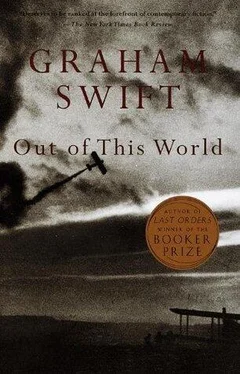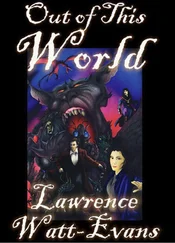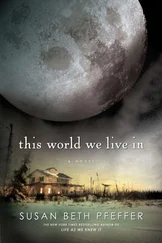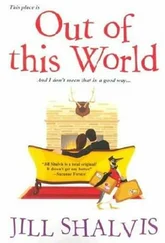Graham Swift - Out of This World
Здесь есть возможность читать онлайн «Graham Swift - Out of This World» весь текст электронной книги совершенно бесплатно (целиком полную версию без сокращений). В некоторых случаях можно слушать аудио, скачать через торрент в формате fb2 и присутствует краткое содержание. Год выпуска: 2012, Издательство: Vintage, Жанр: Современная проза, на английском языке. Описание произведения, (предисловие) а так же отзывы посетителей доступны на портале библиотеки ЛибКат.
- Название:Out of This World
- Автор:
- Издательство:Vintage
- Жанр:
- Год:2012
- ISBN:нет данных
- Рейтинг книги:3 / 5. Голосов: 1
-
Избранное:Добавить в избранное
- Отзывы:
-
Ваша оценка:
- 60
- 1
- 2
- 3
- 4
- 5
Out of This World: краткое содержание, описание и аннотация
Предлагаем к чтению аннотацию, описание, краткое содержание или предисловие (зависит от того, что написал сам автор книги «Out of This World»). Если вы не нашли необходимую информацию о книге — напишите в комментариях, мы постараемся отыскать её.
Out of This World — читать онлайн бесплатно полную книгу (весь текст) целиком
Ниже представлен текст книги, разбитый по страницам. Система сохранения места последней прочитанной страницы, позволяет с удобством читать онлайн бесплатно книгу «Out of This World», без необходимости каждый раз заново искать на чём Вы остановились. Поставьте закладку, и сможете в любой момент перейти на страницу, на которой закончили чтение.
Интервал:
Закладка:
He said there was no logic. Richard and Edward being volunteers and getting killed, Richard at Neuve Chapelle and Edward at Loos, while he was still a cadet. And him being a regular officer and surviving.
He came out of the Great War in 1918, minus a wife, minus two brothers and minus an arm. But he had acquired the rank of Major, a Victoria Cross, and a son whom, because of periods of hospitalization, he scarcely saw for the first year of that son’s life, but whom, in any case, or so the son would later surmise, he had no special wish to see at all. He was in his early twenties but he was already a middle-aged man. He was also, since his two brothers were dead, the sole heir to the family business. And, given the nature of that business, and the business of the world in the previous few years, he was also about to be rich.
In 1923, one year after the death of his father, with the intention of adopting the obsolescent, crusty old style of a sort of squire without a manor, he bought Hyfield House, a Queen Anne building in Surrey, with its own driveway, gardens, orchard and paddock. No one saw through this pose to a former youthful nincompoop. Absence of a limb and the possession of a false one had conferred on him a mysterious solidity and integrity. He never remarried. He sent his son to boarding school. He engaged in public tasks. He did charitable works. He was referred to, respectfully, as ‘the Major’ by the local people, who would see him gliding by in his chauffeur-driven car. But he walked, every Sunday, to the church where his grave would be.
He said: ‘Do you know what my father said to me, just before he died? He said, “I’m proud of you, Bob.” And do you know what he meant by that? He meant I was a damn good mascot. I was the best bloody advertisement BMC ever had. He might have thought once I was a fool and a liability, but now — everything else apart — I was a walking asset. I’d be damn good for business.’
Every so often, I look through Dad’s arms. Did you know that? He left them to me. Never threw one away. I live in this cottage in Wiltshire with a stash of nine artificial arms. All there. Except one, of course.
When Jenny said, ‘What’s in that big trunk?’, I said, ‘My father.’ I didn’t mean it as a bad joke.
You remember how he made such a thing of it? How it was a big day when he got a new model — when he ‘went electronic’. How he used to talk about ‘going to see his tailor’. And all those tired, old, obvious puns about being in the arms business.
I always wondered which way round it was: was he trying to make his arm like the rest of himself, or the rest of himself like his arm? I never saw the stump. What about you, Sophie? Never ‘helped him in’. You never believed he was a different man once — before Anna, before you. I can’t remember when I first thought: Dad has only one real arm — once he must have had two.
Another woman might have said: Jesus! Either they go or I do. Jenny said, ‘Show me.’
Sometimes I’ve thought there must be some institution, some worthy cause somewhere that would be glad of them, that would know what to do with them. But then I’ve thought: These are bits of Dad.
They are like a miniature museum of prosthetic technology. (The words we might never have had to learn!) But they are more than that. The earlier ones are shapely, useless bits of sculpture that gradually lose their anthropomorphic wishfulness and their aesthetic pretensions; the later ones look like nothing human, but actually simulate the function of an arm.
They are like an index of the twentieth century.
Sophie
You think it’s a long time to be on a plane? Another six hours. You think they should get you from New York to London in — well, you tell me, how long? One hour? Half an hour? A couple of minutes?
But look at it another way. Only seven hours to fly from New York to London. It takes days to cross the Atlantic Ocean by ship. It used to take weeks. And once they didn’t even know that America was there , on the other side. You’re not impressed? You don’t think it’s so great to be thousands of feet up in the sky in a jumbo jet? You’ve done it before when we flew that time to Miami with Daddy. With Daddy. So what’s new?
Or look at it another way. Seven hours. And yet we’re flying so fast that we’ll actually shorten time. You’ll see. In a little while it’ll be dark, but it won’t stay dark for very long. Not like a normal night. When we land in London it’ll be breakfast-time there, when for us it should still be the middle of the night. And it will all seem strange.
It’s because we’re travelling in one direction but the sun is travelling in another. And the sun is moving slower than we are. Don’t you think that’s wonderful? To be moving faster than the sun? Of course, it’s not that the sun is really moving. The sun isn’t really going anywhere. It’s that the earth — It’s–
When do they show us the movie? Oh, in a little while yet, I guess. When everyone’s settled. First they give us a drink and some food on a tray. But you don’t really want to watch the movie, do you? On planes it’s always a bad movie. And don’t you think it’s weird — to be thousands of feet up in the air and to want to pretend you’re in a movie-house? The real movie is out there , isn’t it? Those clouds — look, we’re above them! A whole ocean sliding underneath us.
You know, a long time ago, they’d have thought what we’re doing now was magic. Impossible! Out of this world! They’d have thought only gods could fly up into the sky. And now we get into these things and stow our luggage and fasten our seat-belts — and say: How about something to keep us amused?!
Let’s not watch the movie, my angels. Let’s not even listen to the music on the head-sets. Don’t neglect your mother. You know, I’m getting the feeling she’s not such a good flier as you are. It’s true, she’s always been a little nervous. Ever since — Let’s just be together, here, above the world. There are more important things than movies. And it’ll be tomorrow sooner than you think. It’ll be tomorrow before it’s even stopped being today. And your mother has only six hours.
Harry
But once everything was black and white. No, I don’t mean simpler, clearer — when were they ever that? I mean, literally: monochrome.
Picture your father, Sophie, walking down Fleet Street on a grey, wet day in the grey post-war year of 1948. He wears the non-colours that are everywhere around him (like a true news photographer, he blends in with his surroundings): grey raincoat, dark suit, dark-grey trilby. The cars that pass him are black and grey. The city buildings are charcoal studies: soot and stone. The wet road and the clock-face over the Daily Telegraph building and the smoke from a train on the Blackfriars line and the grey dome of St Paul’s against a grey sky are all the tones of newsprint and photographs.
And yet his heart is full of colour, his heart is aglow with colour, in that year of your birth. More colour than it will ever have in the days of Kodachrome and technicolour and colour TVs and that mainstay of his future career, the Sunday colour supplement.
If you are happy, why go looking for trouble?
Colour appeared, in shy, unstable tints, in the Forties and Fifties, then blossomed — yellow cars! Pink shirts! Shop-fronts that fluoresced! — in that bright new age in which you grew up. Was all that to do with the perfecting of the three-colour emulsion process — as if the world had glimpsed itself in some new and flattering mirror — or was it to do, like rising hemlines and marijuana and rockets into space, with sheer high spirits? And was it only coincidence that the years that had preceded, the years of world wars and depressions and newsreels and family albums, should be clad, or so it seems in my memory, in sullen shades of grey?
Читать дальшеИнтервал:
Закладка:
Похожие книги на «Out of This World»
Представляем Вашему вниманию похожие книги на «Out of This World» списком для выбора. Мы отобрали схожую по названию и смыслу литературу в надежде предоставить читателям больше вариантов отыскать новые, интересные, ещё непрочитанные произведения.
Обсуждение, отзывы о книге «Out of This World» и просто собственные мнения читателей. Оставьте ваши комментарии, напишите, что Вы думаете о произведении, его смысле или главных героях. Укажите что конкретно понравилось, а что нет, и почему Вы так считаете.












